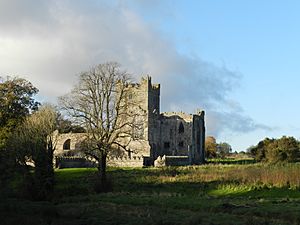John Chevir facts for kids
John Chevir or Chevyr (c. 1410 – 1474) was an Irish judge and politician of the fifteenth century. He held the offices of Lord Chief Justice of Ireland and Master of the Rolls in Ireland, and was also one of the first recorded Speakers of the Irish House of Commons.
Family
He was born in Kilkenny, a younger son of John Chevir senior, justice of the peace for County Kilkenny. The family were descended from Sir William Chevre (living 1174) who settled in County Wexford after the Norman Conquest of Ireland, and witnessed the foundation charter for Tintern Abbey, County Wexford. John was the younger brother of William Chevir (died 1446) who also had a successful, if somewhat turbulent, political and judicial career. William held office as a judge of the Court of King's Bench (Ireland), Deputy Treasurer of Ireland and Deputy to the Lord Chancellor of Ireland.
Career
John was studying law at Lincoln's Inn in 1442. A few years afterwards he was acting as legal adviser to James Butler, 4th Earl of Ormonde, in London. He returned to Ireland before 1450. John and his brother were strong supporters of the Earl of Ormonde's faction, which was one of the two main parties in Irish politics in the 1430s and 1440s.
He was appointed Master of the Rolls in 1450; this was then a less important office than it became later, its duties being administrative rather than judicial. It was clearly a part-time office since he was returned to the Irish House of Commons at the same time and was one of its first known Speakers. The Parliament of 1453-4 ordered him to appear before them with certain records of Parliament which they believed had been placed in the Master's custody. which had originally been granted to him in 1450, on his appointment as Master.
He married Anne Bermingham, who outlived him. Given his unusual surname (which is thought to be the original form of Cheever) it is probable that they were the parents of John Chevir, a merchant of Dublin, who in 1479 was one of those permitted by Edward IV to build a chantry at the Church of St. Nicholas Without, Dublin, following his father's example.


